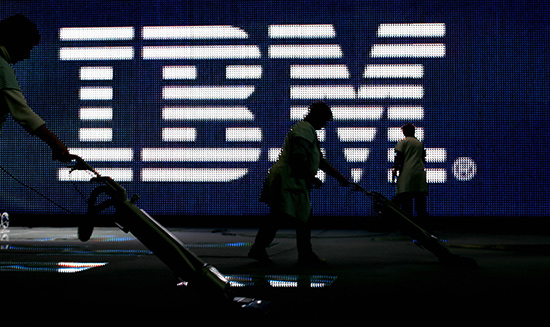IBM驳斥谷歌“量子霸权”说

|
所谓“量子霸权”,是指量子计算机在执行某项任务上的效能远远超过了传统计算机。最近,谷歌研究人员声称该公司的量子计算机已经在特定领域实现了“量子霸权”。对谷歌的这种说法,IBM公司的科学家在本周一晚间予以了驳斥,称“这个目标还没有实现”。 谷歌这一具有里程碑意义的成就是在上个月曝光的。据《财富》杂志当时报道,有一篇还没正式刊发的论文意外地从美国宇航局的官网上泄露了出来——美国宇航局也是谷歌的合作伙伴之一。不过谷歌对这个可能具有历史意义的成就却只字未提,这让大家不禁猜想,谷歌或许是与某家科学杂志签了独家发布协议,在某个特定日期到来之前,还无法向外界透露更多细节——而这一天可能已经不远了。 谷歌的这篇“官泄”论文称,该公司的研究人员在一台量子计算机上进行了一次特殊的运算,耗时约3分20秒。而一台最先进的传统超级计算机“大约需要1万年才能完成同样的任务”。 IBM公司近日驳斥了谷歌的断言。设在纽约州约克镇高地的IBM研究部门的几位科学家表示,利用高等数学和一系列复杂的计算技术,“只需要两天半时间,就能对同一任务进行完美模拟,而且精确度要好得多。”而且这还是“保守的、最差的估计。” IBM的研究团队表示,他们估计的运算时间,是基于对一台53量子比特的普通量子计算机的模拟——谷歌的量子计算机就是53量子比特的。如果需要模拟一台54量子比特的量子计算机,则要耗时5.8天。 IBM团队还表示:“据我们估计,通过进一步的改进,传统计算机的模拟成本还可以进一步降低。” IBM实际上并没有执行它提出的运算理论。它只是在网站上发表了一篇科研论文,文中写道,该公司“提供了一个对该模拟策略的详细描述”。Arxiv是一个论文预印本存储库,科学家们可以在同行评审前上传论文的预印本。 IBM的逆向分析必须借助全球最强大的超级计算机Summit。这是一台由IBM设计的超级计算机,主机位于美国橡树岭国家实验室。我们现在还不清楚这台超级计算机怎样能模拟更多量子比特的运算。毕竟量子计算机每增加一个量子比特,量子计算的性能和复杂性就会呈指数级增长。 IBM的论文将谷歌的量子线路分解为一些“子线路”,从而使传统计算机更易于执行模拟任务。该论文利用了一些高等数学的原理——比如张量网络原理,它可以同时表示多个数字系统,从而模拟“纠缠”等复杂的量子现象。该论文还指出,要想完成这次想象中的巨量运算,还需要为Summit超级计算机增配充足的硬盘存储空间。 IBM的科学家在一篇博客文章中还进一步质疑了“量子霸权”这个术语:“我们已经有充分证据表明,‘量子霸权’这个词正在被广泛地误解,并且造成了越来越多的困惑。所以我们建议不要使用这个术语,并且真诚地征询业界的意见,看是否应该取消这个术语。” 目前,各大科技企业都在争相开发量子计算机的底层硬件,谷歌和IBM是其中的两个领跑者,也是激烈的竞争对手。专家们相信,量子计算将带来科学技术的巨大进步,将造福包括药品开发、人工智能和化学建模在内的多个领域。 IBM的研究人员写道:“谷歌的实验出色地证明,基于超导技术的量子计算已经取得了一定进展(谷歌和IBM自己都采用了同样的硬件实现方法)。但它不应该被视为量子计算机比经典计算机更具有‘优势’的证据。” 谷歌的一位发言人拒绝对此发表评论。(财富中文网) 译者:朴成奎 |
IBM scientists have rejected Google researchers’ claim to have achieved “quantum supremacy,” a demonstration that a quantum computer can vastly outperform a traditional one on a particular task. They contend in a blog post published Monday evening that “the goal has not been met.” Google’s supposed milestone achievement became public last month when a preprint scientific paper accidentally leaked on the website of NASA, a collaborator, as Fortune reported at the time. Google has said nothing about the potentially historic experiment since then, lending credence to whispers that its researchers are bound to silence under the terms of a news embargo by a major science journal, unable to disclose more information until a certain date which is presumed to be imminent. Google’s leaked paper claimed that its researchers ran a special computation on a quantum computer that took three minutes and 20 seconds, whereas a state-of-the-art supercomputer would have taken “approximately 10,000 years to perform the equivalent task.” IBM contradicts Google’s assertion. Several scientists within IBM’s research division, based in Yorktown Heights, N.Y., counter that, using advanced mathematics and a collection of sophisticated computing techniques, “an ideal simulation of the same task can be performed in 2.5 days and with far greater fidelity”—a conclusion the team calls “a conservative, worst-case estimate.” This time estimate holds for simulating the output of a quantum machine, such as Google’s, bearing 53 qubits, the quantum equivalent of an ordinary computer’s bits, IBM’s team says. Simulating the work of a 54-qubit machine would take 5.8 days, it says. “We expect that with additional refinements the classical cost of the simulation can be further reduced,”the IBM team adds. IBM did not actually perform the calculations it proposes. The company instead provided “a detailed description of the proposed simulation strategy,” it writes, in a new scientific paper published on Arxiv, a digital preprint repository where scientists can upload papers prior to peer review. IBM’s contrarian analysis hinges on using the world’s most powerful supercomputer, Summit, an IBM-designed machine which is housed at Oak Ridge National Laboratory. It remains unclear how the machine would handle the simulation of more qubits, each of which increases the power and complexity of quantum calculations exponentially. IBM’s paper breaks down the simulation of Google’s quantum circuit into “subcircuits,” making the task easier for a classical computer to perform. The paper proposes using advanced mathematical concepts—such as tensor networks, which can represent multiple systems of numbers at once—to mimic the behavior of weird quantum phenomena such as “entanglement.” The paper also proposes supplementing the Summit supercomputer’s main memory banks with ample disk storage to enable it to accomplish the hypothetical computational feat. In their blog post, the IBM scientists further take issue with the term “quantum supremacy” and its pursuit. They write, “since we already have ample evidence that the term ‘quantum supremacy’ is being broadly misinterpreted and causing ever growing amounts of confusion, we recommend that it not be used and sincerely ask the community whether it is time to retire the term.” Google and IBM are two frontrunners—and fierce competitors—in big business’ race to develop hardware underlying quantum computers. Experts believe quantum computing will lead to major scientific and technological advances, including improved drug discovery, enhanced artificial intelligence techniques, and chemical modeling. “Google’s experiment is an excellent demonstration of the progress in superconducting-based quantum computing,” IBM’s researchers write, referring to the hardware approach both Google and itself are taking, “but it should not be viewed as proof that quantum computers are ‘supreme’ over classical computers.” A Google spokesperson declined to comment. |











